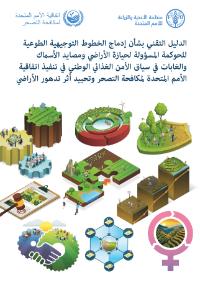Location
The United Nations Convention to Combat Desertification in Those Countries Experiencing Serious Drought and/or Desertification, Particularly in Africa (UNCCD) is a Convention to combat desertification and mitigate the effects of drought through national action programs that incorporate long-term strategies supported by international cooperation and partnership arrangements.
Members:
Resources
Displaying 81 - 85 of 585About UNCCD. Web content quick guide
Established in 1994, the United Nations Convention to Combat Desertification (UNCCD) is the sole legally binding international agreement linking environment and development to sustainable land management. The Convention addresses specifically the arid, semi-arid and dry sub-humid areas, known as the drylands, where some of the most vulnerable ecosystems and peoples can be found.
Sustainable Development Goals and the environment in Europe: a cross-country analysis and 39 country profiles
At the United Nations (UN) Sustainable Development Summit on 25-26 September 2015, world leaders adopted the global framework ‘Transforming our World: The 2030 Agenda for Sustainable Development’, which included 17 global Sustainable Development Goals (SDGs) and 169 targets. The 2030 Agenda builds on the Millennium Development Goals and aims to eradicate poverty, leaving no one behind, and to shift the world on to a sustainable and resilient path.
Supporting the Global Response to the COVID-19 Pandemic: Land-based Solutions for Healthy People and a Healthy Planet
Land is the foundation for all life on Earth. How land is used and managed influences nature, food, water, energy, climate, and even our health. Today, the pressures on land and the wealth of resources it provides are greater than at any other time in human history.
الدليل التقني بشأن إدماج الخطوط التوجيهية الطوعية للحوكمة المسؤولة لحيازة الأراضي ومصايد الأسماك والغابات في سياق الأمن الغذائي الوطني في تنفيذ اتفاقية الأمم المتحدة لمكافحة التصحر وتحييد أثر تدهور الأراضي
يتناول هذا الدليل التقني، الذي اشتركت في إعداده أمانتا منظمة الأمم المتحدة للأغذية والزراعة (الفاو) واتفاقية الأمم المتحدة لمكافحة التصحر، بمساهمات من أصحاب المصلحة المتعددين، إدماج المبادئ التوجيهية الطوعية بشأن الإدارة المسؤولة لحيازة الأراضي ومصائد الأسماك والغابات في سياق الأمن الغذائي الوطني في تنفيذ اتفاقية الأمم المتحدة لمكافحة التصحر وتحييد أثر تدهور الأراضي. وبالتالي فتح فصل جديد في الجهود الجارية لمكافحة التصحر وتدهور الأراضي والجفاف.
Land Degradation Neutrality in Small Island Developing States. Briefing Note
Many Small Island Developing States (SIDS) have committed to establishing national voluntary LDN targets. By establishing LDN targets, SIDS have defined their ambitions and key priorities to address land degradation. The LDN target setting process allowed national stakeholders to systematically analyze the causes and effects of land degradation and to come up with evidence-based decisions on what is desirable and feasible to avoid, reduce or reverse land degradation by 2030.



